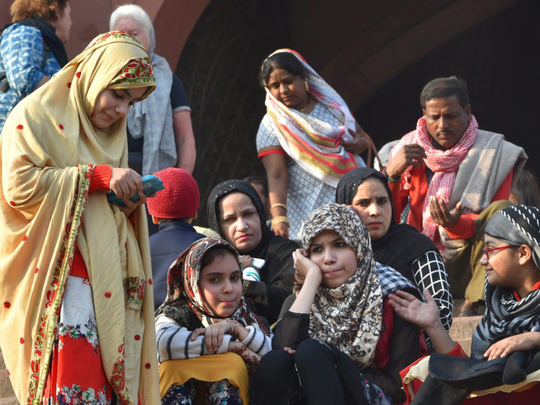
Only the naive will believe that a deep concern for the welfare of Muslim “sisters” and for the maintenance of the “dignity of women” and “gender equality” persuaded India’s ruling Bharatiya Janata Party (BJP) to introduce the bill in parliament to ban triple talaq [a practice that allows Muslim men to divorce their wives by reciting the word talaq, meaning divorce, three times].
For a party whose founder in its previous incarnation, Syama Prasad Mookerjee, thought that only a civil war can solve the Hindu-Muslim problem, as Tripura’s Governor, Tathagata Roy of the BJP, reminded us recently, and a BJP candidate in the Gujarat elections sought a reduction in the numbers of “topi and dadhiwalas” (sartorial allusion to Muslims), it strains credulity to believe that the move has been guided solely by laudable motives.
The belief will persist, therefore, that it is a desire to “garner votes” that spurred the decision, although Union Law Minister Ravi Shankar Prasad denied such a motive.
Few will deny, of course, that the practice of triple talaq itself is highly condemnable, not least because it is illegal even in Islamic countries. For a secular country, therefore, to allow it to prevail points to a flawed outlook whose roots lie in political calculations.
It cannot be contradicted that the BJP is outlawing triple talaq for gaining political mileage, both from sections of Muslim women and from those Hindus who will see the proposed law, first, as an example of “brother” Modi’s distress over the sufferings of Muslim women and, secondly, as a message to Muslims in general that the days are gone when they were given excessive leeway by less assertive governments.
The “secular” rulers of the past, on the other hand, also thought that they would gain votes by pandering to the predilections of the obscurantists among the minorities.
The worst example of this regressive attitude was the Shah Bano episode when the government of former prime minister Rajiv Gandhi negated a Supreme Court verdict in favour of alimony for a divorced Muslim woman on the advice of Muslim fundamentalists.
Since the BJP’s rise from the sidelines of politics to the mainstream can be traced to that event in the mid-1980s, the Congress will have to tread carefully in deciding on its stance on the bill, which has followed the Supreme Court’s recent declaration of triple talaq as unconstitutional in a case involving the litigant, Shayara Bano.
The difficulty for the Congress is that it has given secularism a bad name by making the concept virtually synonymous with minority appeasement. While the BJP will not mind being closely associated with Hinduism, the Congress has been trying to shed the impression that it has become “Mussalmanon ki party” or a party of Muslims, as the Congress leader, Ashok Gehlot, has said, ever since the 2014 defeat made it aware of this unwelcome image, as the A.K. Antony report pointed out.
The triple talaq bill gives Congress an opportunity to refurbish its reputation by articulating a rational position on drafting the law, aimed at protecting Muslim women from cruel and whimsical divorces and at the same time ensuring that the legislation does not lead to a police witch-hunt targeting men. Since the bill has still to pass through the Rajya Sabha, Parliament’s upper house, there is ample scope for fine-tuning it for smoothing out the rough edges, the most egregious of which is to introduce an element of criminality in a civil legal procedure.
If the Congress and other “secular” parties play a leading role in ensuring that the new law will unequivocally serve the ends of justice where no one — neither the women, nor the men, nor the children of divorced parents — will suffer, then these parties will be able to retrieve much of their lost reputation about cynical kowtowing to bigots in the Muslim community and reassure the country in general that politics can rise above partisan and opportunistic considerations.
From this standpoint, the bill provides a golden opportunity to the secular outfits, even if the BJP runs away with much of the credit for introducing it.
Outside of politics, what is noteworthy is the failure of the Muslims to deal with the problem on their own. But ever since partition robbed the community of bold, educated leaders and self-confidence by inducing the minority complex of being forever under siege under the numerically superior Hindus — unlike other minorities like Sikhs and Parsis who have retained their poise and self-belief — the Muslims in India have come under retrogressive influence.
Triple talaq is one manifestation of such backwardness along with polygamy, reinforcing age-old patriarchal norms. Only a small section of upper-middle class women in India — film stars and sports persons being prominent among them — has been able to extricate itself from its grasp. But the majority of the poor and lower-middle class women have been denied the opportunity of advancement by orthodox Muslim society.
The new law offers them a ray of hope.
— IANS
Amulya Ganguli is a political analyst.











